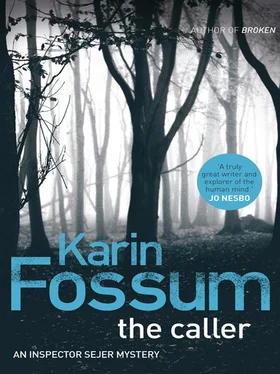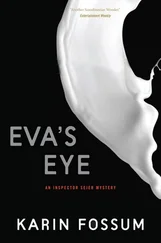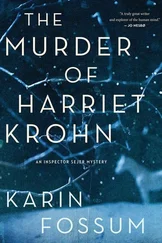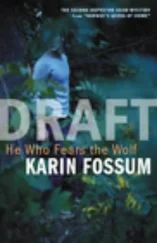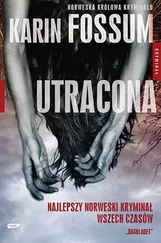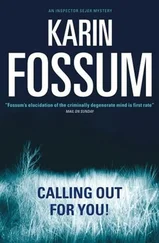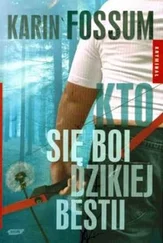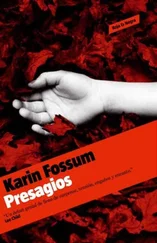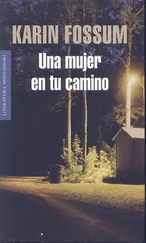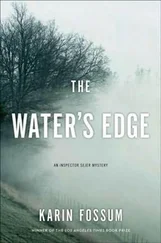‘I’ll eat later. Don’t wait for me, go ahead and eat.’
She returned to the stove, stirring the food in the poisoned pan. The last he saw of her were her blue-veined legs.
Johnny Beskow stayed away from the house for several hours.
Hot, out of breath and excited about what he’d done. Now there was no way back. His fantasies ran wild, imagining dramatic scenes of his mother and the poisonous stew: of her eating from the spoon so that it ran down her chin, of her emptying the pot and scraping the bottom. He had visions of his mother convulsing. He saw her teeth clattering in her mouth, saw her suddenly collapse on to the table, then leap up and stumble around in the throes of death, eyes bloodshot and foam spilling from her mouth. She sounded her death rattle, drooling and falling, then scrambled to her feet and stumbled through each room. When she reached the telephone to call for help, her eyesight was weak, and she couldn’t see clearly. She tried to open a window, to call out to someone walking past, but her fingers disobeyed her and she failed to pop the latch. And anyway, she had lost her voice. Now she was poisoned. Her arms and legs were poisoned; her heart and brain were poisoned. Poison pumped through her bloodstream, made its deadly way to every last cell of her body. Finally she went down for good. Maybe she dragged something with her when she fell, made a violent commotion. Because she shouldn’t be allowed to die in a peaceful manner. She should leave this world in pain and suffering.
Or so Johnny Beskow thought.
He rode to the Sparbo Dam. Parked the moped against a spruce, put his gloves inside his helmet. He walked ten steps along the dam wall, and sat down. The water roared and foamed on its way through the pipes and down into the valley. He sat there a long time waiting for the poison to take effect. Restlessly he roamed the forest trails, rode here and there and watched the time. After four hours he figured it was over. He set his course for home, rolled into the driveway and parked.
He stood there a while, listening.
The house had never been so quiet.
He imagined her lying in the bathroom.
On the floor, her face flat against the old yellow tiles. Maybe she had fallen next to the sofa, having attempted to reach it. Or maybe she had dragged herself into the bedroom and lain on her bed. Standing still in the hall, he could not hear a sound. From there he went into the bathroom, and from the bathroom he went into the lounge. Where she stood rummaging in a drawer of her writing desk. She looked up.
‘What’s wrong with you?’ she shouted. ‘Why are you sneaking about like that? You look like a thief in your own house. For God’s sake, you scared me. Why do you stand there gawping like that? Have you seen a ghost or what?’
Alive and kicking, she gesticulated wildly with her hands. She had a pulse, she made sounds. She could think, cobble sentences together into bad thoughts — just as he had done. She could go on pouring her vodka. In his confusion Johnny was mute. She didn’t look sick at all. There was even a trace of colour in her cheeks.
He went into the kitchen, puzzled. The pan was on the stove, but it was empty. His mother had poured the stew into a large, blue Tupperware container with a lid. She came in.
‘Take what you want,’ she said. ‘I’ll put the rest in the freezer. We’ll eat it another time.’
Escaping to his room, he felt gloomy and disappointed, because he hadn’t been able to create a spectacle and hadn’t got rid of her once and for all, as he’d thought. He spent the entire evening on his bed pondering while Butch scampered around on the duvet. Apparently she hadn’t eaten enough of the poisonous stew, or hadn’t eaten any of it.
Night came, and he went to bed.
He heard his mother bustling about in her room. A logical thought struck him: maybe she had eaten, maybe even a good portion, but the rat poison worked very slowly. That’s what he’d read on the package — that the rats need several doses before they breathed their last. So maybe it would take the hyena a while to die. The thought of her pain lasting several days excited him. Poisoning was like a war, and there was a kind of logic to the way the small grains attacked. First they destroyed the liver and kidneys, then the lungs and the heart.
He wrapped the duvet snugly around him, a warm lair of down and cloth.
He tried to make plans for the following day. I’ll have to do something creative, he thought, while I wait for the poison to do its work. While I wait for the hyena to fall to her knees.
Little Theo Bosch sat attentively in front of the television, a bag of Delight crisps in his lap. With just 9 per cent fat, the crisps were approved by his mother, who was careful about such things. He had put a DVD in the machine and followed closely what happened on the screen. Watching Lars Monsen’s green canoe slice through the water, Theo thought he looked like a real mountain man with his tangle of hair and beard: fishing for trout, making up a campfire, sleeping under the open sky. If the wolf howled out there in the dark, Lars Monsen didn’t get scared, because it was just Good Old Greyleg gathering his flock. A fearless man, Lars Monsen wandered the wilderness with such confidence that Theo dreamed himself far away. After he’d watched two whole episodes, he leapt from the sofa and ran to find his mother. But she wasn’t in the kitchen or out in the garden. His father came in while he was searching for her.
‘She’s resting,’ he said. ‘She has a headache. That’s women for you. They need a room of their own where they can be in peace.’
Theo raced up to his parents’ bedroom on the first floor, where he found his mother lying on the queen-sized bed, her face towards the wall. It was stifling hot. She had removed all her clothes and had simply pulled the sheet over her. But the sheet had slid down, and her naked white rump glowed in the dark room.
Theo stood there, staring, a finger in his mouth.
Hannes tiptoed in. He leaned against the door. ‘Look at that,’ he said. ‘Her bottom looks like two soft buns.’
At that they laughed in the way of boys.
‘Can I hike to Snellevann?’ Theo asked. ‘By myself?’
Hannes Bosch furrowed his brow. He glanced down at his wife’s tempting behind, and then looked at his son. Theo was an obedient child with a certain intensity which often served him well.
‘To Snellevann. By yourself? Now? Do you mean right now?’
Theo nodded. He looked pleadingly at his father. His head was filled with images of the wilderness and so too was his heart. He could hear the song of the forest in the enormous spruces. He wanted to hear the birds sing, see the fish jump. Theo the explorer, that’s what he wanted to be.
‘I’ll take my lunch,’ he whispered. ‘You can help me pack my rucksack so I’ve got everything I need.’
Hannes Bosch cast a glance at his watch. It was still early. He put his hand on his son’s head. Theo wasn’t much more than a tiny tot, but he was a bright boy, and no sissy. To Snellevann, he thought, on his little legs. That would take him an hour. Then he’d probably sit at the water’s edge for twenty minutes before coming home; all in all, it’d take two hours and twenty minutes — a long time for a little boy. To Snellevann. All by himself. Hannes walked to the window and looked out. The weather was fine, and nightfall was a long way off. There was also a good deal of pedestrian traffic on the way to Snellevann. Landowners and farmers spent time in their fields seeing to their cows and sheep, putting out salt blocks, checking the fences. Not to mention hikers and cyclists, and maybe people picking berries. But Theo was just eight years old. On the other hand, it’s safer in the woods than almost anywhere else. They’d agreed on that long ago.
Читать дальше
